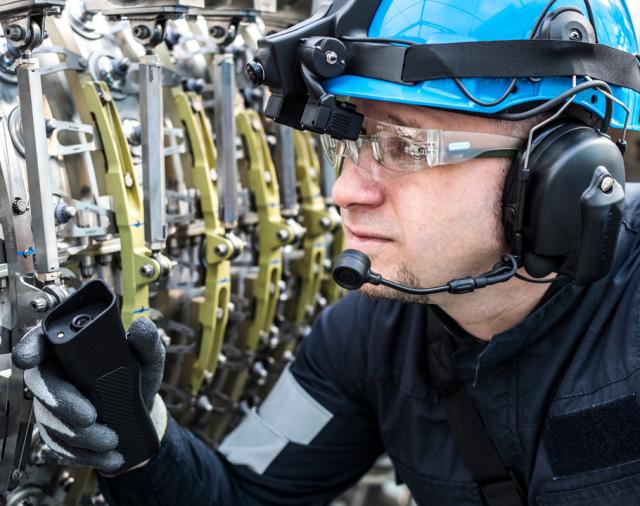
BHGE provides field service engineers Smart Helmets, which enable engineers in the field to communicate with staff located at a headquarters facility who can guide the engineers through complex tasks by audio and video. (Source: Baker Hughes, a GE company)
Whether it is called the information age, the digital transformation or just the changing of the times, the ways in which the oil and gas industry works is evolving. No longer is it a question of if the cutting-edge technologies leveraged by tech-savvy companies and imagined by science fiction will make their way into the oil and gas industry, but rather how far-reaching their impact will be and how they will affect the industry’s workforce. Today’s workers are becoming more efficient and more productive, and tasks are becoming safer thanks to innovations that push the limits of reality.
Augmented reality (AR) and virtual reality (VR) are transforming training and maintenance programs by helping the workforce see and understand their environments in ways never before possible. Aerial drones are making the industry safer by taking workers out of potentially hazardous situations while collecting data at a faster rate and in quantities not possible by traditional methods.
Oil majors like BP, Devon and Total, along with service providers like Halliburton, Schlumberger and Baker Hughes, a GE company (BHGE), are either testing many of these technologies or have fully adopted them. Once—or if—fully realized across the industry, these innovations could have a profound impact.
A January 2017 World Economic Forum white paper, compiled in collaboration with Accenture, reported that digital transformation in the oil and gas industry could result in more than $1.5 trillion of value for the industry, its customers and wider society.
E&P’s cover story this month focuses on trends in digital innovations that are being leveraged by companies around the world. “Upgrading the industry in the information age” focuses on how companies are utilizing aerial drones and robots, AR and VR, and wearable technologies to improve efficiencies and enhance safety. In addition, editors spoke to Binu Mathew, senior vice president and global head of digital products for BHGE, about the challenges of implementing artificial intelligence and digital technologies.
Seismos, a technology provider for the oil and gas industry, reports on a suite of products that monitor perforation effectiveness and well connectivity in real time, while AspenTech addresses ways in which the large amounts of data are best utilized. In addition, Seven Lakes Technologies offers insights into how capital planning can help streamline existing processes and reduce errors, and Quorum Software describes innovations in well life-cycle reporting in the digital age.
These technologies, among countless others, are leading the oil and gas industry into a new age that features streamlined operations, substantially improved safety and a workforce that blends human know-how and ingenuity with cutting-edge digital innovations.
Read each of E&P magazine's April cover stories:
Upgrading the industry in the information age
Examining the industry’s AI and digitalization challenges
Providing additional insights into unconventional plays
Well life-cycle reporting in the digital age
Recommended Reading
Phillips 66’s NGL Focus, Midstream Acquisitions Pay Off in 2024
2025-02-04 - Phillips 66 reported record volumes for 2024 as it advances a wellhead-to-market strategy within its midstream business.
Rising Phoenix Capital Launches $20MM Mineral Fund
2025-02-05 - Rising Phoenix Capital said the La Plata Peak Income Fund focuses on acquiring producing royalty interests that provide consistent cash flow without drilling risk.
Equinor Commences First Tranche of $5B Share Buyback
2025-02-07 - Equinor began the first tranche of a share repurchase of up to $5 billion.
Q&A: Petrie Partners Co-Founder Offers the Private Equity Perspective
2025-02-19 - Applying veteran wisdom to the oil and gas finance landscape, trends for 2025 begin to emerge.
Chevron Makes Leadership, Organizational Changes in Bid to Simplify
2025-02-24 - Chevron Corp. is consolidating its oil, products and gas organization into two segments: upstream and downstream, midstream and chemicals.
Comments
Add new comment
This conversation is moderated according to Hart Energy community rules. Please read the rules before joining the discussion. If you’re experiencing any technical problems, please contact our customer care team.





